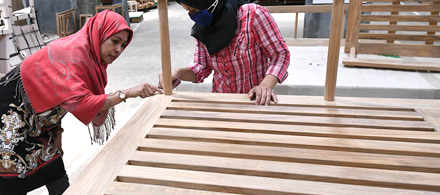
Maria Murliantini is a trailblazer, the factory she owns in Indonesia’s furniture making capital Jepara was one of the first to export only products made from verified legal teak to buyers in the EU. Her efforts are helping to build Jepara’s reputation as a home to legally-registered companies making quality products from legally-harvested timber. Source: Timberbiz
They are also linking consumers in Europe with Indonesian villagers who take care of their local forests. And having seen the benefits of ensuring her supplies are legal, Murliantini is encouraging other companies to follow suit.
Murliantini’s company, Sunteak Alliance, is classed as medium-sized. It employs 100-150 workers on the factory floor, with more in busy periods. In 2011, it became one of the first Indonesian companies of its size to gain Forest Stewardship Council (FSC) certification, showing it could trace its teak back to responsibly managed forests. This was a requirement for many European buyers.
But because FSC-certified teak was in short supply and expensive, Murliantini struggled to meet customer demand and her exports declined significantly. This would have been fatal for her business. But around the same time, her buyers began asking for a new kind of certificate called SVLK that guarantees that products have been legally harvested and produced.
SVLK stands for System Verifikasi Legalitas Kayu (Timber Legality Verification System in English). It was developed by Indonesia to addressed illegality by verifying legal compliance throughout the supply chain. It has since been backed by the EU through a trade deal agreed under the EU Forest Law Enforcement, Governance and Trade (FLEGT) Action Plan on illegal logging.
As a result, Indonesian companies can now only export timber products to the EU if it has been verified legal by the SVLK and issued with FLEGT licences that attest to their legality. The EU will not allow Indonesian products without FLEGT-licences to enter.





